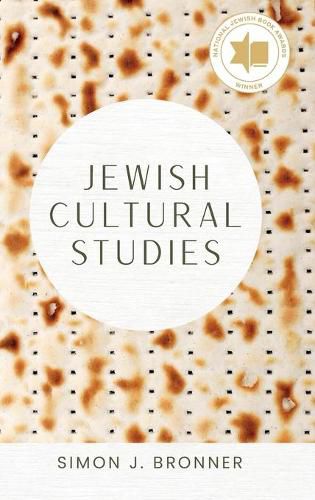Readings Newsletter
Become a Readings Member to make your shopping experience even easier.
Sign in or sign up for free!
You’re not far away from qualifying for FREE standard shipping within Australia
You’ve qualified for FREE standard shipping within Australia
The cart is loading…






Jewish Cultural Studies charts the contours and boundaries of Jewish cultural studies and the issues of Jewish culture that make it so intriguing-and necessary-not only for Jews but also for students of identity, ethnicity, and diversity generally. In addition to framing the distinguishing features of Jewish culture and the ways it has been studied, and often misrepresented and maligned, Simon J. Bronner presents several case studies using ethnography, folkloristic interpretation, and rhetorical analysis. Bronner, building on many years of global cultural exploration, locates patterns, processes, frames, and themes of events and actions identified as Jewish to discern what makes them appear Jewish and why. Jewish Cultural Studies is divided into three parts. Part 1 deals with the conceptualization of how Jews in complex, heterogenous societies identify themselves as a cultural group to non-Jews and vice versa-such as how the Jewish home is socially and materially constructed. Part 2 delves into ritualization as a strategic Jewish practice for perpetuating peoplehood and the values that it suggests-for example, the rising popularity of naming ceremonies for newborn girls, simhat bat or zeved habat, in the twenty-first century. Part 3 explores narration, including the global transformation of Jewish joking in online settings and the role of Jews in American political culture. Bronner reflects that a reason to separate Jewish cultural studies from the fields of Jewish studies and cultural studies is the distinctiveness of Jewish culture among other ethnic experiences. As a diasporic group with religious ties and varying local customs, Jews present difficulties of categorization. He encourages a multiperspectival approach that considers the Jewish double consciousness as being aware of both insider and outsider perspectives, participation in ancient tradition and recent modernization, and the great variety and stigmatization of Jewish experience and cultural expression. Students and scholars in Jewish studies, cultural studies, ethnic-religious studies, folklore, sociology, psychology, and ethnology are the intended audience for this book.
$9.00 standard shipping within Australia
FREE standard shipping within Australia for orders over $100.00
Express & International shipping calculated at checkout
Jewish Cultural Studies charts the contours and boundaries of Jewish cultural studies and the issues of Jewish culture that make it so intriguing-and necessary-not only for Jews but also for students of identity, ethnicity, and diversity generally. In addition to framing the distinguishing features of Jewish culture and the ways it has been studied, and often misrepresented and maligned, Simon J. Bronner presents several case studies using ethnography, folkloristic interpretation, and rhetorical analysis. Bronner, building on many years of global cultural exploration, locates patterns, processes, frames, and themes of events and actions identified as Jewish to discern what makes them appear Jewish and why. Jewish Cultural Studies is divided into three parts. Part 1 deals with the conceptualization of how Jews in complex, heterogenous societies identify themselves as a cultural group to non-Jews and vice versa-such as how the Jewish home is socially and materially constructed. Part 2 delves into ritualization as a strategic Jewish practice for perpetuating peoplehood and the values that it suggests-for example, the rising popularity of naming ceremonies for newborn girls, simhat bat or zeved habat, in the twenty-first century. Part 3 explores narration, including the global transformation of Jewish joking in online settings and the role of Jews in American political culture. Bronner reflects that a reason to separate Jewish cultural studies from the fields of Jewish studies and cultural studies is the distinctiveness of Jewish culture among other ethnic experiences. As a diasporic group with religious ties and varying local customs, Jews present difficulties of categorization. He encourages a multiperspectival approach that considers the Jewish double consciousness as being aware of both insider and outsider perspectives, participation in ancient tradition and recent modernization, and the great variety and stigmatization of Jewish experience and cultural expression. Students and scholars in Jewish studies, cultural studies, ethnic-religious studies, folklore, sociology, psychology, and ethnology are the intended audience for this book.